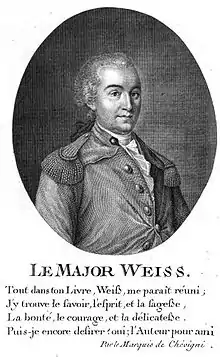François-Rodolphe de Weiss
François-Rodolphe de Weiss (von Weiss, also von Weiß, surname at birth Wyss) (1751–1818) was a Swiss political and military leader, writer and philosopher, a follower of Jean-Jacques Rousseau.

Life
He was born at Yverdon, son of François Rodolphe, seigneur de Daillens, and Henriette Russillon. He entered the French military service in 1766, and the Prussian in 1777. In 1785 he became a member of the Grand Conseil at Berne.[1]
A supporter of the ideas of the French Revolution, de Weiss was sent to Paris as an envoy in 1792, and maintained a peace between France and the Swiss confederation.[1] In 1794 he attributed the Revolution to ideas emanating from Geneva.[2]
In 1798 the Bernese bailiwick at Lucens Castle was ended by a popular uprising, with Weiss defending the castle.[3]
Weiss then went into exile, in Germany. He died by suicide at Coppet on 21 July 1818.[1]
Works
- Principes philosophiques, politiques et moraux, 2 vol. (1785). A successful work of philosophy in the style of the 18th century, translated into German and English.[4]
- Réveillez-vous Suisses, le danger approche (1798), Lyon, Imprimerie Franoy. This work was published in January 1798 during the Diet of Aarau, called to consider political reform.[5]
Notes
- "Weiss, François Rodolphe de, Dictionnaire historique de la Suisse". Retrieved 9 June 2016.
- Richard Whatmore (31 July 2012). Against War and Empire: Geneva, Britain, and France in the Eighteenth Century. Yale University Press. p. 102. ISBN 978-0-300-17557-8.
- "History, Château de Lucens". Retrieved 30 January 2017.
- fr:s:Biographie universelle ancienne et moderne/2e éd., 1843/WEISS (François-Rodolphe)
- "Rethinking Republicanism in Switzerland during 1798–1801". Retrieved 10 June 2016.